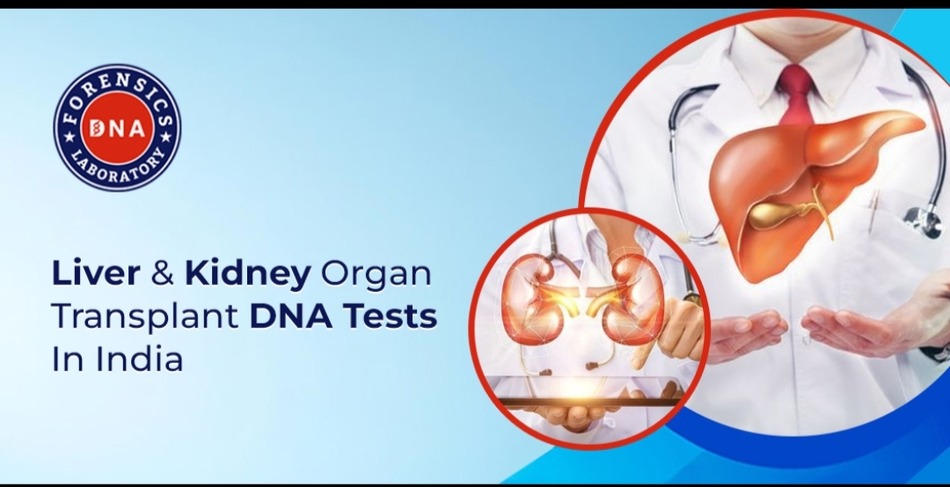Organ Transplant DNA Test for Donor Relationship in India
Organ transplantation procedures, like kidney or liver transplants, often require a close biological match between the donor and recipient. This was provisioned by the amendments in the Transplantation of Human Organs Act in 2014. Doing so was necessary for many reasons. When procured from a close biological relative, the process is believed to prevent the body’s immunity from rejecting the transplanted organ. Another and the most important benefit of doing so was to prevent the exploitation of donors and to put a check on illegal practices. It certainly helped authorities and law enforcement put a check on practices like unethical organ procurement and broke the bones of organ rackets. Today, in the case of a close relative, donating an organ requires the parties to undergo DNA testing. Kidney Organ Transplant DNA Tests and DNA Tests for Liver Transplants are some of the most commonly used DNA Tests for Donor Relationships in India.
Legal Requirements for a DNA Test for Donor Relationship in India
For hospitals and surgeons in India, getting the parties’ DNA test is a legal mandate. This ensures compliance with the Transplantation of Human Organs Act ( Rules 2014) and prevents fraud or illegal organ rackets. According to these rules:
- Getting a DNA Test for Donor Relationships in India and submitting the test report along with Form 5 is mandatory. The Form-5 is presented to the organ transplant approval committee, which then allows for the transplantation when the relationship is confirmed.
- DNA testing for Organ Transplantation cases must be conducted by an NABL-accredited laboratory, and the report must accompany the Form 5 certificate.
- Approval committees for live organ transplants will not process incomplete applications that are missing a DNA test report.
Relationships to Get a Liver and Kidney Organ Transplant DNA Test For
The type of DNA test performed depends on the claimed relationship between the organ recipient and the living donor. Relationships that are generally involved in organ transplantation cases and require a DNA Test for Kidney Transplant or Liver Transplant include:
- Paternity Test: For verifying if the donor is the father.
- Maternity Test: To confirm if the donor is the mother.
- Siblingship Test: Used for donor-recipient pairs claiming to be siblings.
- YSTR Analysis: Tests paternal-side relationships (e.g., grandfather, uncle).
- Mitochondrial DNA Test: Confirms maternal-line relationships (e.g., grandmother, aunt).
- Kinship Test: Autosomal markers are used for extended relationships.
Steps Involved in DNA Testing for Organ Transplantation
The process for Organ transplant DNA tests includes the following steps:
Sample Collection:
– A buccal swab or blood sample is collected from both the donor and recipient.
– The process is non-invasive and conducted under supervision.
DNA Analysis:
– Laboratories analyze specific genetic markers using advanced techniques like STR (Short Tandem Repeat) profiling.
– Specialized tests like YSTR or mtDNA are used for paternal or maternal lineage verification.
Report Generation:
– Results include a conclusive statement about the genetic relationship.
– The report is certified and provided along with Form 5 for submission to the approval committee.
Turnaround Time:
– The entire process typically takes 7–10 business days, though express options may be available.
Things to Look for in a DNA Testing Laboratory
For DNA tests used in organ transplantation, specific accreditations and certifications are mandatory to ensure reliability:
- NABL Accreditation: Laboratories must be certified by the National Accreditation Board for Testing and Calibration Laboratories. This ensures compliance with international standards for testing accuracy.
- Compliance with Rules: Laboratories should adhere to guidelines outlined in the Transplantation of Human Organs Act, 2014.
- Confidentiality Standards: Accredited laboratories follow strict protocols to maintain the confidentiality of donor and recipient data.
- Advanced DNA Testing Techniques Used: DNA tests for organ transplants employ advanced techniques, including STR profiling, Y-STR analysis, and mtDNA testing.
Notable Cases Of Illegal Organ Trades and Transplantations:
- In 2024, Gurugram police and the Gurugram health department conducted a joint operation and busted a cross-border organ transplant racket. It involved Bangladeshi donors who were not related with the donors. The illegal transplants were conducted in private hospitals in Jaipur, leading to multiple arrests and highlighting the complexities of international organ trafficking.
- In October 2023, a Chennai-based hospital was found to have conducted an unauthorized kidney transplant for a businessman without following the legal protocols. The donor later reported not receiving the promised amount, which made authorities dig into the matter and soon this case was busted.
DNA Forensics Laboratory – For Liver and Kidney Organ Transplant DNA Tests
At DNA Forensics Laboratory, we provide NABL-accredited DNA Tests for Donor Relationships in India. We also provide Form-5 certification, ensuring compliance with rules for organ transplantation.
Common types of tests we provide include:
- DNA Test for Liver Transplant and
- DNA Test for Kidney Transplant
What Makes Us Best for a DNA Test for Donor Relationship in India
Here are some other reasons that make us ideal for an organ transplant DNA tests in India:
- Decade-Long Experience: We have nearly 10 years of experience in DNA testing for peace of mind purposes, like paternity and maternity testing. Besides, we specialize in organ transplants, immigration, and many more.
- NABL-Accredited Facility: Our laboratory is NABL-accredited, ensuring the highest standards of testing accuracy and reliability in all reports.
- Expert Staff: We have a highly qualified, experienced, and committed team of skilled technicians & genetic scientists. They make sure the best practices are followed for the test. This confirms the highest accuracy of the test reports.
- Seamless Assistance: Our rigorously trained customer service executives can help you navigate through the process of your DNA test.
- Extensive Collection Network: With over 400 collection centers across India and globally, our services are accessible nationwide.
- Fast Turnaround Time: We prioritize rapid report delivery for organ transplant cases, understanding the sensitivity and urgency involved.
Our Clients:
We have successfully done and are currently providing accredited DNA Tests for Liver Transplant and Kidney Transplants to our esteemed clients. They are:
- Max Healthcare Institute Limited
- Medanta – The Medicity
- Apollo Hospitals Enterprise Limited
- Fortis Healthcare Limited
- Aster CMI Hospital
- Manipal Hospitals
- Sakra World Hospital
- Metro Group of Hospitals
- CSIR (Council of Scientific and Industrial Research)
- AIIMS, New Delhi
- ACTREC – a part of Tata Memorial Centre
Choose DNA Forensics Laboratory for precise, reliable, and efficient organ transplant DNA testing services. Call us at +91 8010177771 or WhatsApp at +91 9266615552 to learn more or book your DNA Test for Donor Relationships in India.






